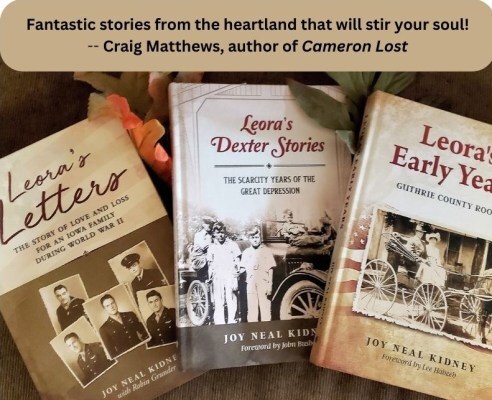Joy Neal Kidney's Blog, page 31
October 9, 2023
Leora’s Dexter Stories on Smorgasbord Book Promotions

In this series authors were invited to share an excerpt of 500 words from any of their published books
Submissions are now closed for this series but there will be another in early 2024.. My thanks to all who have participated.
Today the featured author is Joy Neal Kidney with an excerpt from another of her heartwarming historical biography of her family’s life – Leora’s Dexter Stories: The Scarcity Years of the Great Depression
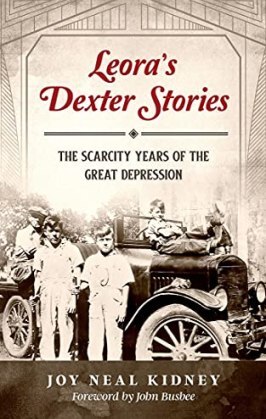
About the book
The undertow of the Great Depression becomes poignantly personal as we experience the travails of Leora and Clabe Wilson, a displaced Iowa farm family. Gritty determination fuels this family’s journey of loss and hope, a reflection of what many American families endured during those challenging times.
In this true story the Wilsons slowly slide into unemployment and poverty. Leora must find ways to keep her dreams alive while making a haven for her flock of seven children in one run-down house after another.
An excerpt from the book – Chapter 24 – Machine Perm in Redfield
The Wilsons’ teenage daughter wanted a permanent wave. The summer before her junior year, Doris heard that a Redfield woman gave machine perms for $3. From babysitting a doctor’s children (25 cents an hour if the wife paid her, 50 cents an hour if he did), Doris had saved up the $3.
But how to get the seven miles to Redfield and back? Her mother decided she would go with her and found someone going to Redfield. He couldn’t bring them home but they could start out on foot, and surely someone from Dexter would be headed south out of Redfield and give them a ride the rest of the way.
For being out in public, which included attending her daughter’s first perm, Leora wore her good dress and two-inch Cuban heeled shoes.
The beautician started Doris’s “machine perm” by bathing strands of hair with a chemical solution, then smoothed each section around a metal roller. Each was secured with a clamp and tethered by cords to an electrical contraption that heated curlers, solution, and tresses.
Picture Medusa from mythology. Doris’s hair began to sizzle.
She kept her head very still. The whole room smelled of strong chemicals. When a spot on her head got too hot, the operator blew on it with a small bellows. Every so often the hairdresser unclamped and unrolled a curler to check the progress. When she determined that the curl was complete, she undid the rollers to reveal the new ringlets.
Doris, happy with her new look, counted out the $3, all in coins. “Be sure to wait a week before washing your curls,” she was cautioned.
Doris, reeking of chemicals, and her mother headed south out of town on foot. Cars breezed by, swishing their skirts, but no one they knew stopped to offer a ride.
In spite of the hills, their trek back to Dexter was pleasant, except for that one big downslope about halfway home. As mother and daughter trudged down the steepness, Leora’s feet slid forward in her shoes.
After they got home, Leora sat down and pulled the shoes from her sore feet. Doris was so thrilled with her new waved hair that she didn’t realize her mother had suffered.
During the next few days, Leora’s toenails began to turn black. Eventually she lost most of them.
Otherwise, the machine perm was a success–no more curling iron before school–even though it left the ends of Doris’s hair a reddish color from being singed, and pieces of her hair broke off for quite a while.
But Doris and her mother were reminded by the hills south of Redfield that Iowa certainly isn’t flat.
©Joy Neal Kidney
One of the reviews for the book
Elizabeth Gauffreau 5.0 out of 5 stars A Heartwarming Story of a Family Struggling to Overcome Economic Adversity Reviewed in the United StatesAfter reading Joy Neal Kidney’s first book, Leora’s Letters: The Story of Love and Loss for an Iowa Family in World War II, I eagerly awaited the follow-up. I am happy to report that Leora’s Dexter Stories: The Scarcity Years of the Great Depression did not disappoint.
The Leora of both books was Kidney’s maternal grandmother, Leora Goff Wilson, who was born in 1890 and died in 1987. Through reading about her, I feel I have come to know her almost as a member of my own family. I am quite fond of her, in fact.
In the the preface, Kidney provides this description of the woman you will meet in Leora’s Dexter Stories:
“She was an uncomplicated woman with straightforward goals: a home of their own, surrounded by family, and high school diplomas for her children. She was determined to do the hard work to accomplish her mission.”
Leora documented her family’s life and her own experiences through letters and journals. Kidney’s mother Doris provided her own first-hand accounts, and Kidney supplemented the family stories with extensive historical research. Family photographs are also included in the book, which further contributes to giving the reader a real sense of the individual members of the Wilson family and the family as a whole.
The book uses the techniques of creative nonfiction–story narration, scene, description, and dialog–to bring the Wilson family and their experiences during the Depression to life. One particularly striking example of Kidney’s adeptness with creative nonfiction is how the same belongings reappear throughout the book as the Wilsons move from one rundown house lacking indoor plumbing to another. At each new place, they are home when Clabe, the father, hangs “the velvet Home Sweet Home picture, the plate rail, and their familiar family photos” on the wall.
The section that made the biggest impression on me came early in the book: In the time before vaccines for childhood illnesses, having nine children come down with whooping cough at the same time, the two youngest, five-week-old twins, dying from it. There were several other experiences that stayed with me long after I finished reading the book: the sense of being looked down on by people in town for being on relief; how it broke a man’s spirit to be unable to provide for his family, no matter how hard he tried; the two eldest sons joining the Navy, marveling at the abundance of good food and sending money home to the family.
The book is balanced with some light moments, my favorite of which is Clabe’s impulsive decision to lop off the top of the family’s Model T truck to make a “sports roadster.” The photo of the roadster with youngest son Junior on the hood and pet squirrel Rusty on the front fender is not to be missed.
In addition to highly recommending Leora’s Dexter Stories to readers interested in the heartwarming story of a family struggling to overcome economic adversity, I would urge teachers of 20th-century US history classes to assign the book as supplemental reading. (A set of discussion questions is included at the end of the book to assist teachers and book club leaders.)
Read the reviews and buy the book: Amazon US – And: Amazon UK
Also by Joy Neal Kidney
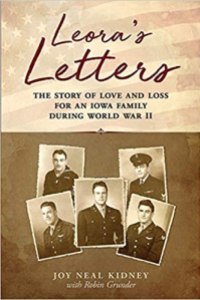
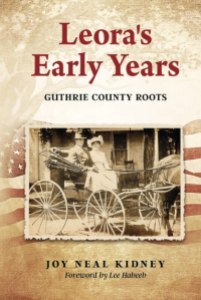
Read the reviews and buy the books: Amazon US – And: Amazon UK – More reviews: Goodreads – Website: Joy Neal Kidney – Facebook: Joy Neal Kidney Author – Twitter: @JoyNealKidney – Instagram: Joy Neal Kidney

About Joy Neal Kidney
Joy Neal Kidney is the oldest granddaughter of Leora Wilson, who lost three sons during WWII and was widowed, all during a three-year period. Through the decades, Joy helped take Memorial Day bouquets to the graves of those three young uncles, not knowing that only one of them is buried there–until decades later, after the death of her courageous little Grandma Leora.
Joy became a writer in order to tell her stories.
She and her husband, Guy (an Air Force Veteran of the Vietnam War and retired Air Traffic Controller) live in central Iowa. Their son is married and they live out-of-state with a small daughter named Kate.
A graduate of the University of Northern Iowa, Joy has lived with fibromyalgia for two dozen years, giving her plenty of home-bound days to write blog posts and books, working with research from decades earlier.
All of the “Leora books” tell stories about world and national events reaching into the American Heartland–westward expansion, two world wars, pandemics, how mental health issues were handled, the Great Depression, and surviving great personal losses. But they are hopeful as well.
Thank you for dropping in today and I hope you will be leaving with some books.. Sally.
October 7, 2023
October 6, 2023
Book Cover! What Leora Never Knew: A Granddaughter’s Quest for Answers
Book cover!
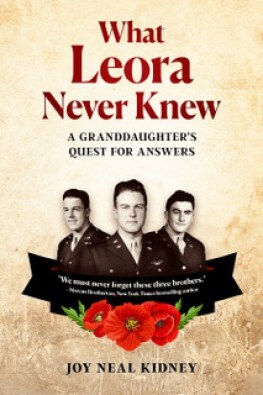
Nelly Murariu @PixBeeDesign.com has designed the covers for all four “Leora books.”
Robin Grunder was my coauthor for Leora’s Letters. Through her Legacy Press, she has shepherded the last three to publication .
Five brothers served. Only two came home.
Only one is buried at home. I didn’t know that until my mid-40s, when Grandma Leora died. Having helped with Memorial Day flowers for three graves all those decades, I had to know what happened, why one is buried overseas, and why one has never been found.
What Leora Never Knew: A Granddaughter’s Quest for Answers, my journey of research and remembrance, will be published later this month.
Whoever dwells in the shelter of the Most High will rest in the shadow of the Almighty. Psalm 91:1
October 4, 2023
Claiborne Daniel Wilson (January 7, 1888-October 5, 1946)
Death Takes Clabe Wilson
Final Rites Scheduled Wednesday Afternoon
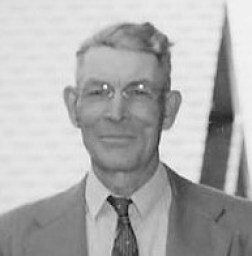 Clabe Wilson, taken in Omaha, Nebraska, May 12, 1946 (Mother’s Day)
Clabe Wilson, taken in Omaha, Nebraska, May 12, 1946 (Mother’s Day)“Death came about 9:30 pm Saturday to Claiborne (Clabe) D. Wilson, 58 year old local farmer, at his home two miles southeast of Perry. He had suffered a general breakdown in his health.
“Funeral services are set for 2:30 pm Wednesday at the Workman Funeral home. The Rev. Lyle V. Newman, First Christian church pastor, will officiate and burial will be in the Violet Hill cemetery.
“The body lies in state at the funeral home.
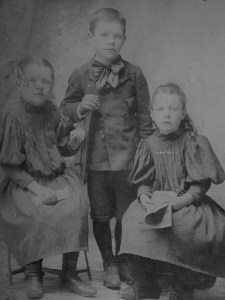 Rectha, Clabe, and Alice Wilson
Rectha, Clabe, and Alice Wilson“Mr. Wilson, son of the late Mr. and Mrs. Daniel Wilson, was born Jan. 7, 1888 near Coon Rapids in Carroll County.
“During his lifetime he farmed in various localities, including Guthrie Center, Dexter, and Minburn. He had moved to his present home about two years ago.
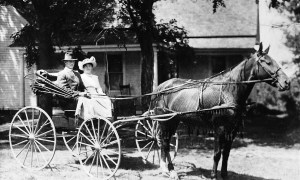 Newlyweds Clabe and Leora Wilson, in front of Clabe’s mother’s house at Panora, 1914
Newlyweds Clabe and Leora Wilson, in front of Clabe’s mother’s house at Panora, 1914“On Feb. 15, 1944 he was married to Leora Goff, who survives. Also living are two sons, Delbert G. of Perry and Donald W., who is in the navy; two daughters, Mrs. Warren D. Neal of Redfield and Mrs. Alvin C. [called Sam] Scar of Earlham, a half-brother, Fred Davis of Des Moines; three sisters, Mrs. Alice McLuen of Stuart, Mrs. Fonnie Kiggen of Boston, Mass., and Mrs. Verna Parrott of Des Moines; and several nieces and nephews.
“Preceding him in death were three sons, all casualties of the recent world war. They were Dale R., Daniel S., and Claiborne J.”
Perry Daily Chief, October 7, 1946
Clabe Wilson died of a stroke and a broken heart. He is buried at the Violet Hill Cemetery in Perry, Iowa.
—–
Clabe Wilson grew up in Guthrie County, living there until the 1920s. Those stories are told in Leora’s Early Years: Guthrie County Roots. (Both of Clabe’s parents died in a state hospital when he was a young man.) Clabe and Leora’s children grew up at Dexter during tough times. Leora’s Dexter Years: The Scarcity Years of the Great Depression is filled with those stories.
Their heart-rending story of the war years are in Leora’s Letters: The Story of Love and Loss for an Iowa Family During World War II. In the Audible version, Paul Berge especially brings Clabe to life. Here’s a 5-minute clip.
All five of Clabe and Leora’s sons are remembered on the Dallas County Freedom Rock® at Minburn, not far from where they were tenant farmers from 1939 to 1944.
October 3, 2023
The Legacy, brand new book by Cherie Dargan
The Legacy by Cherie Dargan
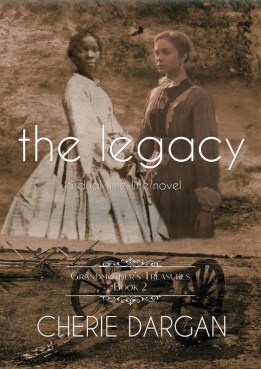
Sarah, a widowed schoolteacher, rushes to be with her sister, Emily, about to give birth. It’s September 1864, and the war has come to Winchester, Virginia yet again. Sadly, Emily and her baby die, leaving Sarah to take Emily’s maid Rebecca and son Bobby to freedom. Her mother insists she take along a young slave named Thomas for protection. It’s almost one hundred miles to Baltimore, where they can take a boat to Boston, and then board a train west. Can Sarah lead this group to safety, avoiding stray Confederates, Union soldiers, and slave catchers? And why does Rebecca say to look for quilt squares on their journey?
In present day, Gracie and her boyfriend, David, visit Grandma Molly over the Christmas holidays. Forty years ago, Molly helped her sisters-in-law clean out a house after their Grandma Mary’s death. Molly found a red and green quilt that no one else wanted, so she brought it home. An old legal envelope was safety-pinned to the quilt, which had a faded bloodstain on the back. A great aunt warned her to burn the envelope and quilt, and after a family gathering, the envelope disappeared. Molly hid the quilt away. Now she wants Gracie to find out if the quilt dates to the Civil War and who made it? However, Grandpa Patrick walks in and makes a fuss. “Ah, Molly, what are you doing with this old quilt again? Can’t you let it go after all this time?” Gracie wonders, what’s going on with my grandparents?
Can Gracie find the story behind the red and green quilt and help her grandparents resolve their problems the way she did with the California quilt?
My Thoughts: Quilts and mysteries from Civil War days, with at least one family member not wanting one mystery to come to life. She says it will destroy their family legacy. What legacy? Over a quilt? This dual-time story is rich with details about both whites and slaves escaping from the South during the war.
It’s also the love story of Iowa descendants of those folks, and their quest to find answers to the mystery behind just who made the Rustic Rose quilt, and why did it have blood stains? Things become complicated when young people connected with White Supremacists try to disrupt anything embracing other races. Cherie Dargan beautifully weaves the two compelling stories into a satisfying novel, The Legacy.
Here is Cherie’s Amazon Author Page.
October 2, 2023
Mom’s Purse by Paul E. Kotz
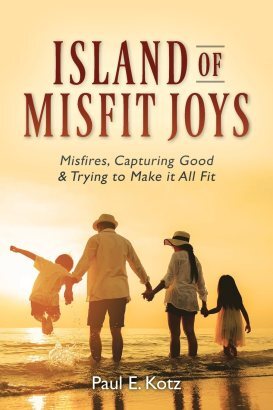 Paul Kotz has a new book out!The Preface: Misfits – Aren’t We All at Times?The chapters of encouragement, gentle nudges to be there for others, and affirmations of worthiness are pure Paul Kotz. How blessed are the students he’s mentored through the years. He is honest and vulnerable in this terrific collection of stories, epiphanies, and nudgings.He shares the links to two of his stories recorded for Our American Stories. You may find them and more here.
Paul Kotz has a new book out!The Preface: Misfits – Aren’t We All at Times?The chapters of encouragement, gentle nudges to be there for others, and affirmations of worthiness are pure Paul Kotz. How blessed are the students he’s mentored through the years. He is honest and vulnerable in this terrific collection of stories, epiphanies, and nudgings.He shares the links to two of his stories recorded for Our American Stories. You may find them and more here.
September 29, 2023
Tough Subjects, Terrific Books
Some terrific books, even redemptive ones, deal with tough subjects. Here are five you might consider:

 Bridges & Angels: The Story of Ruth by David LaBelle
Bridges & Angels: The Story of Ruth by David LaBelle
Haunting and even tormenting at times, this story, which has at it core a real nightmare from the author’s past, also carries with it a redemptive beauty. The author’s gift of photography shows up in compelling similes, giving the reader the experiences right along with the characters.
Unforgettable images and drama. The nursing home scenes are so tastefully wrought.
Dave’s 16-minute interview on Our American Stories.
—–
Cameron Lost by Craig Matthews
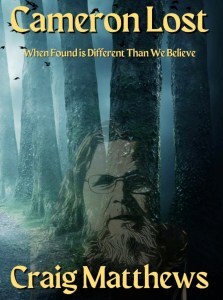 Compelling characters wrestle with their beasts, their demons, even while attempting to forgive and encourage others. Cameron does something unspeakable to his family, knowing it can never be forgiven–by God, by anyone. His journey through his misery takes him on a real one, hiking and hiding in Michigan’s Upper Peninsula. Known by his trail name as Caveman, this miserable misfit meets Butter, also a trail name, who runs a place called the Oasis. Theirs is such a compelling friendship, deeper than that.
Compelling characters wrestle with their beasts, their demons, even while attempting to forgive and encourage others. Cameron does something unspeakable to his family, knowing it can never be forgiven–by God, by anyone. His journey through his misery takes him on a real one, hiking and hiding in Michigan’s Upper Peninsula. Known by his trail name as Caveman, this miserable misfit meets Butter, also a trail name, who runs a place called the Oasis. Theirs is such a compelling friendship, deeper than that.
Cameron Lost takes the reader on a journey through rich UP vistas while sharing in Cameron’s losses and terrible choices and misery to eventual redemption.
Craig’s 24-minute interview on PJNET.tv
—–
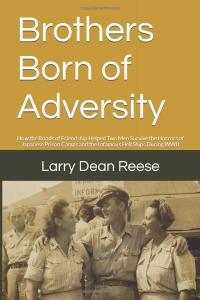 Brothers Born of Adversity
by Larry Dean Reese
Brothers Born of Adversity
by Larry Dean Reese
Subtitle: How the Bonds of Friendship Helped Two Men Survive the Horrors of Japanese Prison Camps and the Infamous Hell Ships During WWII. This is a gruesome episode from World War II that must not be forgotten. The author has masterfully woven the ordeal of the POWs of the Japanese with stories two men told their families about those terrible years.
Since both men had already died, Larry Reese relied on several other sources to corroborate the memories told by their children. George Crowell and Frank “Max” Maxwell were Navy Corpsmen before the war, caught in the Philippines early in the war. They met as POWs at Bilibid prison, where they were held for more than two years.
—–
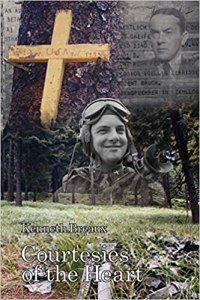 Courtesies of the Heart by Kenneth Breaux
Courtesies of the Heart by Kenneth Breaux
A P-51 pilot is lost in Germany but not located by the Americans for decades. He left a widow and a baby daughter, who feels his absence her whole life. The area where he fell became part of East Germany, so was inaccessible for decades. But one local man buried his remains and cared for the grave for years. This is the amazing story of how several people, speaking three different languages, eventually became a “society of the heart” through the internet and in person.
The P-51 pilot’s remains are brought home for a military burial. Just incredible.
—–
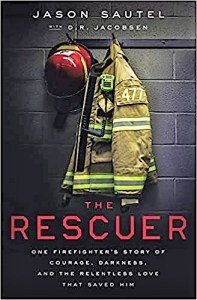
The Rescuer by Jason Sautel
Subtitle: One Firefighter’s Story of Courage, Darkness, and the Relentless Love That Saved Him. This is such compelling book. The author explains so well the emptiness, the darkness, the haunting of a broken past while serving in the physically, mentally, and emotionally challenge as a firefighter. He contrasts it so well with the light and peace that love and salvation bring.
This book is being made into a film.
September 27, 2023
A Suburban Allis-Chalmers Tractor
Once in a while we’d get a glimpse of a vintage orange tractor driving through the neighborhood. My husband knew I liked old tractors, so one day while walking our “loop” he asked if I’d like to meet the man with the orange tractor. Would I!
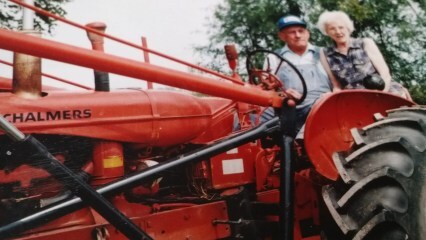 Larry Swanger’s folks with the 1954 Allis-Chalmers WD-45.
Larry Swanger’s folks with the 1954 Allis-Chalmers WD-45.Larry Swanger was in his front yard that day, so that’s when I learned about his father’s 1954 Allis-Chalmers WD-45. Leland Swanger was a lifelong farmer near Creston, Iowa. Larry had the family heirloom restored in 2008 and has been enjoying it ever since.
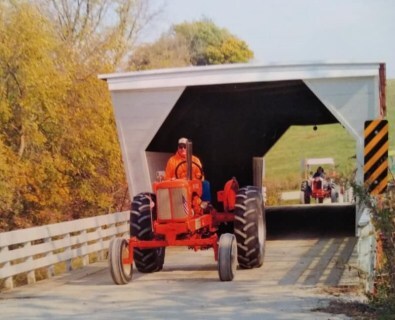 2020 tractor ride
2020 tractor ride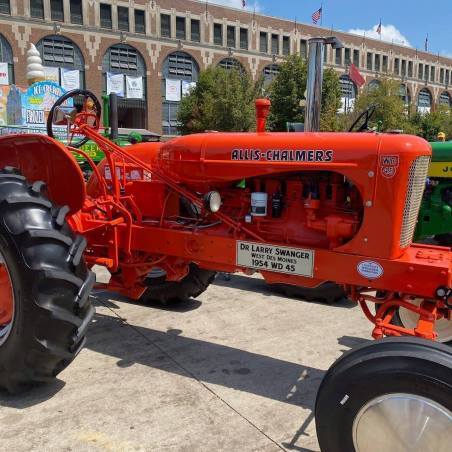 Tractors lining the Grand Concourse of the Iowa State Fair, 2021
Tractors lining the Grand Concourse of the Iowa State Fair, 2021Larry, a retired optometrist, is President-Elect of the Central Iowa Tractor Club. He participates in tractor rides, tractor shows, Tractor Day on the Grand Concourse of the Iowa State Fair, and giving autumn hayrack rides during the local Valley Junction Pumpkin Walk.
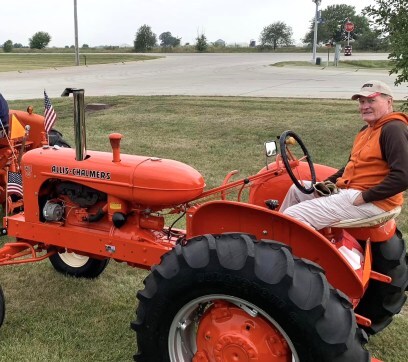 2023
2023The story of Larry Swanger’s father teaching a young man to stack round bales of hay, reprinted from Shepherd Magazine, is in Iowa History Journal, the March/April 2023 issue.
September 25, 2023
The Coleman Sisters of Glidden, Iowa
 Edith “Edie” Coleman Dankle, Julia Coleman Graves, and Rosie Mae Coleman Kidney
Edith “Edie” Coleman Dankle, Julia Coleman Graves, and Rosie Mae Coleman KidneyI’ve always like this old photo of Guy’s Grandma Rosie and her sisters, daughters of Jerome W. and Anna Coleman of Glidden, Iowa.
Jerome and Anna came to Iowa from Bureau County, Illinois, with baby daughter Julia. Jerome helped form the Farmer’s Elevator Company in Glidden and eventually owned 1000 acres of Carroll County land.
Anna gave birth to two more daughters and one son, Charles William Coleman, who served in WWI.
Julia Bell Coleman Graves, Rosie Mae Coleman Kidney, and Edith Grace Coleman Dankle were the sisters.
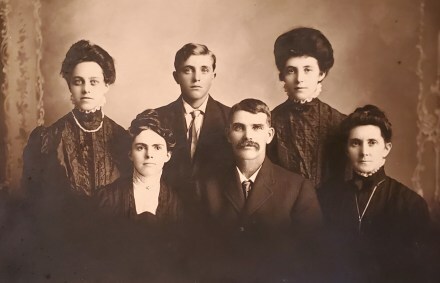 Back: Rosie Coleman Kidney, Charley Coleman, Edith Coleman Dankle. Front: Julia Coleman Graves , Jerome Coleman, Anna Coleman. Photo taken in Carroll, Iowa
Back: Rosie Coleman Kidney, Charley Coleman, Edith Coleman Dankle. Front: Julia Coleman Graves , Jerome Coleman, Anna Coleman. Photo taken in Carroll, IowaThe farmland inherited from her father by Guy’s Grandma Rosie is now owned by Guy’s mother, Carol Kidney Herman, and has been designated a Century Farm, owned by the same family for at least 100 years.
September 23, 2023
The Leora Books
